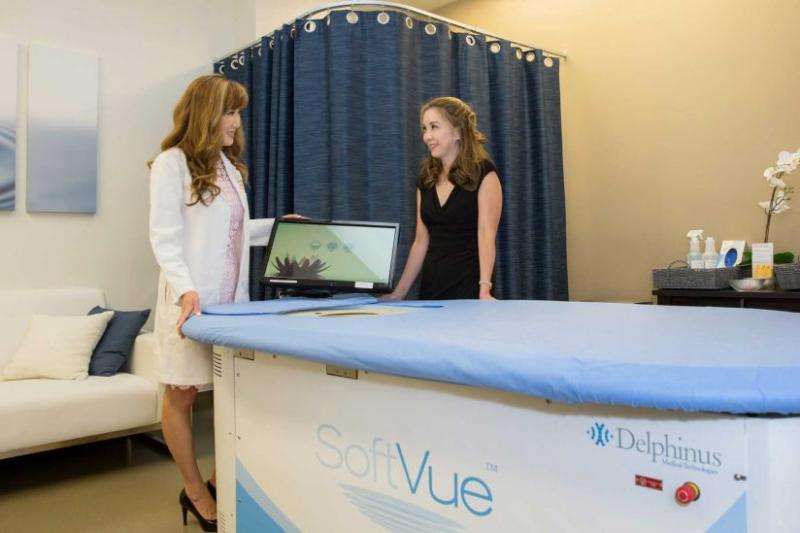New ultrasound technology could save lives of women with dense breast tissue

A new research project at the USC Norris Comprehensive Cancer Center is recruiting women with dense breast tissue to examine the effectiveness of a novel breast ultrasound device. SoftVue is the world's first 3-D, whole-breast ultrasound system that might better assist physicians in distinguishing normal breast tissue from cancers.
"While mammography is the best screening tool for women, we have known for years that breast cancers are much more difficult to see in women with dense breasts," said Mary Yamashita, assistant professor of clinical radiology and the national principal investigator of the research project. "Our hope is that this technology will enable us to detect cancers much sooner in women with dense breast tissue so that we can provide better outcomes for those with cancer and peace of mind for those with a negative study."
More than 40 percent of women nationwide have dense breast tissue, which is unrelated to weight or breast size. Because dense breasts can mask potential cancers on mammography, the sensitivity for detecting cancer is lower in women with dense breasts. Studies have shown that in dense breasts, ultrasound can detect cancers not seen on mammography; however, traditional hand-held ultrasound exams can be time-consuming and often operator-dependent. They also have a high rate of false positives, resulting in unnecessary biopsies and added cost to the health care system.
In contrast, SoftVue is a faster, more automated and gentler system that conducts scans while a woman relaxes on her stomach with her breast supported in a warm water bath. A 360-degree ring transducer images the entire breast in a single pass, moving from the front of the breast to the chest wall. The entire scan takes about two to four minutes per breast, and there is no radiation exposure or compression of the breast. Unlike hand-held ultrasound, SoftVue can provide multiple distinctive tissue qualities to radiologists, allowing them to differentiate possible cancers from normal to benign findings.
"I was not sure what to expect, but the SoftVue exam was both easy and comfortable," said Shauna Lee, the first patient enrolled in this phase of the clinical trial. She discovered she had dense breasts after an appointment with Yamashita and was previously unfamiliar with the term. Lee was excited to enroll in the trial after learning that the technology was more comfortable and potentially more thorough than traditional mammography.
"I am hopeful that this ultrasound could be the new standard of care for women with dense breasts, and I would encourage other women who qualify to enroll in this trial," Lee said.
Measuring the effectiveness
Qualified participants will have both screening mammography and SoftVue exams. Imaging information gathered from the project will compare SoftVue to digital mammography and measure the effectiveness of SoftVue in detecting additional cancers that are not seen with mammography alone.
The study data will be submitted to the U.S. Food and Drug Administration for approval of SoftVue as a supplemental screening indication for women with dense breasts in combination with mammography. SoftVue has received two 510(k) clearances from the FDA for diagnostic breast ultrasound imaging and is not intended for use as a replacement for screening mammography. Currently, the technology is only in use at research sites.
The 10,000-patient nationwide clinical trial will be open at eight sites across the United States, with USC Norris being the only site in Southern California. Women who have been notified about having dense breast tissue on mammography are encouraged to enroll by calling (323) 442-9299 or emailing softvue@usc.edu.













